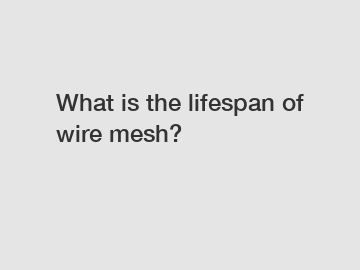What is the lifespan of wire mesh?
What is the lifespan of wire mesh?
Wire mesh is a versatile material used in a wide range of applications, from construction and mining to industrial, residential, and even artistic projects. But have you ever wondered about the lifespan of wire mesh? How long can you rely on this durable material for your various needs? Let's delve into this topic and explore the lifespan of wire mesh.
1. Factors Affecting Lifespan:

The lifespan of wire mesh is influenced by various factors. Understanding these factors will help you make informed decisions regarding its use. The first factor to consider is the type of wire mesh being used. Wire mesh can be made from different materials, such as stainless steel, galvanized steel, or aluminum. Each material has its own set of attributes, including corrosion resistance and durability, which impacts its lifespan.
2. Material Quality:
The quality of the wire mesh itself plays a crucial role in determining its lifespan. Poor-quality wire mesh may have insufficient tensile strength or coating, making it more prone to damage. Investing in high-quality wire mesh from reputable manufacturers ensures longevity and reliability.
3. Exposure to Environment:
The environment in which wire mesh is installed significantly affects its lifespan. Exposure to harsh weather conditions, such as extreme temperatures, high humidity, or excessive UV radiation, can lead to premature degradation and corrosion. For instance, galvanized steel wire mesh performs well in outdoor environments due to its corrosion-resistant zinc coating.
4. Maintenance and Cleaning:
Proper maintenance and regular cleaning are essential for extending the lifespan of wire mesh. Accumulated dirt, debris, and pollutants can corrode the wire mesh over time. Routine inspections and regular cleaning will help identify and remove any potential threats to the material, preserving its integrity.
5. Intended Use and Stress:
The lifespan of wire mesh can also vary depending on its intended use and the stress it is subjected to. In high-stress applications, such as reinforcing concrete or providing structural support, the wire mesh may experience higher wear and tear. Understanding the load-bearing capacities of different wire mesh types is crucial to ensure a longer lifespan.
6. Corrosion and Rust:
Corrosion and rust are significant concerns when it comes to the lifespan of wire mesh, especially in outdoor or humid environments. While stainless steel wire mesh is highly resistant to corrosion, other materials may require additional protective coatings or regular maintenance to prevent rusting.
7. Lifespan Estimates:
Estimating the exact lifespan of wire mesh can be challenging since it depends on various factors and circumstances. As a general guideline, high-quality wire mesh used in typical indoor applications can last anywhere from 20 to 50 years. In more demanding applications, the lifespan may be shorter but can still range from 10 to 30 years.
8. Conclusion:
In conclusion, the lifespan of wire mesh is impacted by several factors, including the type and quality of the material, exposure to the environment, maintenance practices, intended use, and stress levels. Taking these factors into account is essential for ensuring the longevity of wire mesh in any application. By choosing the right material, providing adequate maintenance, and considering the specific environmental conditions and demands, you can maximize the lifespan of your wire mesh. So, next time you use wire mesh for any purpose, remember these points and make the most of this versatile material.
Are you interested in learning more about black stainless steel window screen , perforated copper sheet, perforated copper sheet? Contact us today to secure an expert consultation!
More articles:
What is a wire mesh conveyor belt used for?
Which Galvanised Woven Wire Mesh offers the best durability and value for money?

Comments
0